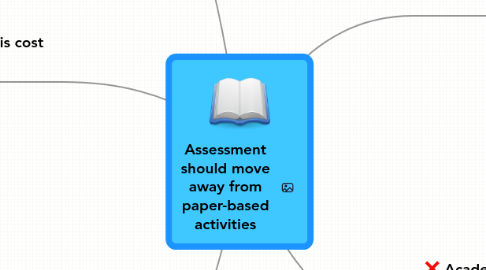
1. Online assessment is hard to moderate and verify (quality issues) [Allen Crawford Thomas, 16.09.09, 1.06 pm]
1.1. Technology allows examiners to quickly compare and analyse answers [Lisa Valentine, 24.09.09, 2.26 pm]
1.2. Offering assessment choice through different media can skew final grades [Lisa Valentine, 24.09.09, 2.26 pm]
2. Online assessment is cost effective
2.1. It is cheaper when compared to the cost of readers for examinations [Lisa Valentine, 21.09.09, 7.45 pm]
2.2. Online assessment is more sustainable [Matt Gallon, 14.09.09, 9.51 am]
2.2.1. Technology can help gather and organise evidence
2.2.1.1. PDAs can be used to take pictures, or voice record reflections [Deborah Judah, 21.09.09, 2.42 pm]
2.2.2. Less paper [MG]
2.2.3. Less cost for posting [MG]
3. Curriculum design and quality\processes are not conducive towards\creative assessment
3.1. Module specifications do not\rallow for innovative assessment\r[Steve Saffhill, 16.09.09, 3.45\rpm]
3.2. Programme managers do not want to conduct 'high risk' assessment [Steve Saffhill, 16.09.09, 3.45 pm]
3.2.1. Issues with the LSC and the audit trail
3.3. Accommodation issues how do you seat and access students at the same time? [Allen Crawford Thomas, 16.09.09, 1.06 pm]
4. Technology improves the assessment process
4.1. Technology enhances the opportunity for formative assessment
4.1.1. Assessment can happen out of the classroom e.g text walls, quizzes [Christine Davies, 20.09.09, 8.28 pm]
4.1.2. Smartboard tools enhance the opportunity for assessment in the classroom [Christine Davies, 20.09.09, 8.28 pm]
4.1.2.1. Other tools such as voting pads are difficult for academic staff to set up in the classroom [Steve Saffhill, 21.09.09, 9.25 am]
4.2. Technology-based assessment can improve retention and achievement
4.2.1. Feedback can be enriched by using technology
4.2.1.1. Media rich snippets [Kevin Brace, 17.09.09, 1.16 pm]
4.2.2. iPods loaded with questions for self assessment worked at Lakes College [Kev Hickey, 14.09.09, 1.53 pm]
4.2.3. Digital media is accessible [Lisa Valentine, 21.09.09, 7.45 pm]
4.3. Examining bodies encourage the use of innovative assessment [Alison Wooton, 14.09.09, 8.41 am]
4.3.1. It enhances flexibility and student engagement [AW]
4.3.1.1. The online driving theory has had over 3 million learners [AW]
4.3.1.2. Online assessment through e-portfolios encourages reflective/reflexive skills [Kevin Brace, 17.09.09, 1.16 pm]
4.3.1.2.1. Peer-peer learning and assessment is harder to grade and manage [Allen Crawford Thomas, 21.09.09, 2.51 pm]
4.3.2. Some bodies like CIPD prefer traditional assessment [Allen Crawford Thomas, 16.09.09, 1.06 pm]
4.3.3. External moderators are reluctant to accept audio and video files [Allen Crawford Thomas, 21.09.09, 3.03 pm]
4.3.3.1. It is hard to quickly find the evidence when going through media files [Alyson Dacey, 23.09.09, 10.04 am]
4.3.3.2. Problems with e-signature
